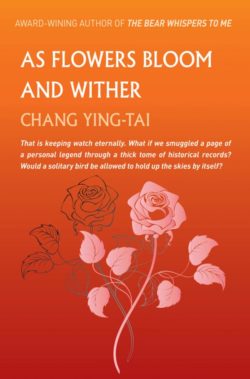As Flowers Bloom and Wither by Chang Ying-tai
translated by Florence Woo
(Balestier Press, 2017)
Publisher's Blurb
As Flowers Bloom and Wither tells a bold and stirring story with great sensitivity. The protagonist, whose true identity was enshrouded in an enormous plot, must brave the thorns of history in order to unravel the threads of this enigma. Will the twists and turns of fate obscure the ultimate truth? How many more “truths” are there behind the so-called “truth”? Can the final answer be reached, despite the torrents of political conflict? While a work of fiction, this novel is also a reflection of reality: in a time of turmoil, individuals lose their ability to make personal choices, their identity becomes muddled, and their feelings of love and hatred become more pronounced as well. This is not just the story of one person, but also the tragic tale of a people. Once the ultimate answer is revealed, love and compassion flourished once again, just like a rose that endured through a bitter winter.
Reading Chinese Network Reviews
Reveiwed by Z.Z. Lehmberg, 20/10/17
 When I was in elementary school in China in the early 70s, I learned to throw grenades in my gym classes – well, they were not real grenades but grenade-shaped weights. We also chanted a slogan at the beginning of each gym class as part of our warm-up routine: “Get fit! Protect Motherland! Liberate Taiwan!” In my young mind, Taiwan was a place where the people lived in “deep water and hot fire” (a saying at the time) under the control of the Kuomintang, definitely not a nice place like the China I knew, where we all lived in “the warm embrace of the CCP” (also a saying at the time).
When I was in elementary school in China in the early 70s, I learned to throw grenades in my gym classes – well, they were not real grenades but grenade-shaped weights. We also chanted a slogan at the beginning of each gym class as part of our warm-up routine: “Get fit! Protect Motherland! Liberate Taiwan!” In my young mind, Taiwan was a place where the people lived in “deep water and hot fire” (a saying at the time) under the control of the Kuomintang, definitely not a nice place like the China I knew, where we all lived in “the warm embrace of the CCP” (also a saying at the time).
Chang Ying-Tai’s novel As Flowers Bloom and Wither contributes to my understanding of Taiwan, especially the complex sibling-like relationship between Taiwan and China. Through her massive and intricate plot, Chang manages to weave together memories of her childhood in Taiwan during the Martial Law Years, historical conflicts between the Kuomintang and the CCP, and the future hopes for Taiwan and China.
As Flowers Bloom and Wither is narrated by Chunhuan, son of a deputy director of the Investigation Bureau of the Kuomintang and editor-in-chief of a news agency for the Kuomintang. Chunhuan tells about his life from infancy to old age, from when he was a baby on a ship retreating from China to Taiwan to when he was over 60 living in China as a researcher. The book covers the horrors of the Martial Law Years in Taiwan, the loyalty and betrayal of the agents who went on missions for the Kuomintang and the CCP, and the friendship and devotion of individuals toward one another. An underlying focus of the book is on Mao Zedong, Zhou Enlai, and Chiang Kai-shek, whose stories, asserts Richard Nixon, former President of the United States, “make up the story of China” during the first half of the 20th century, according to Chunhuan’s research in the book.
Chang gives her readers a good cerebral workout reading As Flowers Bloom and Wither. I keep thinking that I’d love to see Chang’s mind map diagram if she had one when she was writing the book so that I could know better how each character is related and so that sentences like this one would not give me a headache: “The father who raised me was not Song Jiafu. I did not know who he was.” The book is at once entertaining and frustrating to read.
Having lived through China’s Cultural Revolution, I am simultaneously aghast and intrigued by the similarities between what happened in Taiwan during the Martial Law Years and what happened in China during the Cultural Revolution. I could understand Chunhuan’s words when he said, “The world has gone mad.” I also knew what Dr. Liang (a political prisoner who brought Chunhuan to China) meant when he said that “both sides are equally mentally ill!” I find the passages about arrest and interrogation difficult to read because I know the events could be true – similar events happened in China during the Cultural Revolution – even though As Flowers Bloom and Wither is fiction. Through dialogues, Chang challenges her readers to make sense of the madness during the Martial Law Years:
“And then you betrayed others as well?”
“Yes. For survival. Others informed on you to exchange for leniency. You in turn have to inform on others to redeem yourself. The snowball rolls bigger and bigger. Thousands, tens of thousands of people get dragged into the net.”
The above dialogue could be used to describe what happened during the Cultural Revolution in China as well.
As Flowers Bloom and Wither is not an easy book to read. Its grotesque scenes of torture make me want to skip pages (“They told Xiaokang to crouch down and suck them off one by one. And then they had Xiaokang turn around and let them take turns penetrating him.”), but the narratives of twisted love and sacrifices among Chunhuan, his brother Chunshao, and their maids Autumn and Floral make me want to slow down to experience the innocence and humor in the harsh reality (“That day, under full view, Floral ran with me to the toilet. And wiped me after I did my business.”). The description of the brothers dividing ownership of their dog’s body makes me laugh – Chunhuan was only allowed to pet the butt of his dog while his brother got to pet the dog’s head.
Still at times I wanted to stop reading because it was too painful to recognize that what happened in China during the Cultural Revolution also happened in Taiwan during the Martial Law Years; however, I am glad I managed to finish reading Chang Ying-Tai’s As Flowers Bloom and Wither. I am now able to make a better connection between Taiwan and China. I thought it was interesting, to say the least, that when I was being prepared in China to liberate Taiwan one day, children like Chang Ying-Tai were singing songs about exterminating rebel spies in Taiwan.
Though it is not elaborated in the book, the current problems of Taiwan and China are alluded to through a final dialogue between Chunhuan and Chunshao, the two brothers who ended up in China and Taiwan respectively:
“The times have changed. The two sides are standing off for reasons that are different to those from before. . . . The chaos of our days is more complicated than that. It’s disorder, unrest, injustice, the lack of ideals, the grave divide between the rich and the poor . . . .”
“And,” I added, “the dead. We must let go of the hatred, stubbornness, and arguments of the dead.”
We learn from the book that Chiang Kai-shek and Mao Zedong loved China but that they could not work together to make her prosperous. Instead, they created horror for the people who revered them as “Old Papa” and “Helmsman.” Implicitly, Chang is asking her readers to consider these two questions: In our world of chaos, can we all work together to make our world a better place, a peaceful world? What are our missions in life?
I now live and work in the U.S. and my hairdresser is originally from Taiwan. Every time I go to her house to get my hair done, she cooks me something good to eat and tells me about her childhood adventures. The Taiwan in my hairdresser’s stories is definitely not the Taiwan I was taught to liberate when I was a child in China, and neither is it the Taiwan in Chang’s As Flowers Bloom and Wither.
I recommend As Flowers Bloom and Wither to anyone who is interested in a good read, history of Taiwan-China conflicts, and mind-boggling espionage schemes.
Reviewed by Z.Z. Lehmberg.
Reviewed by Hsiu-Chih Sheu, 28/9/17
 We read in the Prologue “ The story you are about to hear is a historical mystery, told by one who is dying, on behalf of one who is dead… a history built with deaths and turmoil.” This historical mystery allows us to glance at the political climate of Taiwan under Chiang Kai Shek’s rule. The story starts with the narrator, Chunhua Song, embarking with his family on a ship bound for Taiwan as part of the Nationalists’ retreat at the end of the 1940s. With both parents in high government position, Chunhua and his older brother enjoy an affluent life and are taught antiques appreciation from young age. The Song family regularly hold parties with friends in high positions for antique appreciation and poetry reading. Yet Chunhua’s best friend is Flora, the scruffy-looking daughter of their maid, who is also his neighbour. Trust and mutual support are the foundation of this unlikely friendship, but are shown later to be non-existent among the parents’ generation.
We read in the Prologue “ The story you are about to hear is a historical mystery, told by one who is dying, on behalf of one who is dead… a history built with deaths and turmoil.” This historical mystery allows us to glance at the political climate of Taiwan under Chiang Kai Shek’s rule. The story starts with the narrator, Chunhua Song, embarking with his family on a ship bound for Taiwan as part of the Nationalists’ retreat at the end of the 1940s. With both parents in high government position, Chunhua and his older brother enjoy an affluent life and are taught antiques appreciation from young age. The Song family regularly hold parties with friends in high positions for antique appreciation and poetry reading. Yet Chunhua’s best friend is Flora, the scruffy-looking daughter of their maid, who is also his neighbour. Trust and mutual support are the foundation of this unlikely friendship, but are shown later to be non-existent among the parents’ generation.
As a child, Chunhua has learned coding from his Mom, who works for counter-intelligence, and develops, for fun, a coded language with Flora. These childhood games turns into his daily life as an adult. Song’s family luck ends abruptly when Chunhua, then in high school, is falsely accused of being a communist spy. In prison, he comes to realize the world he lives in is permeated with spies, and you can be accused of being one anytime, anywhere. You can be sent to jail for attending a wedding or accidentally turning on the wrong radio channel. The unwritten judicial system was “when someone made a report, we had to go to make an arrest” according to a top official he meets in jail. Later on, Chunhua is sent to Green Island (an island on which the Nationalists’ build a notorious prison for the political prisoners), where he meets more real communist spies and finds that his family antique appreciation party is but a coded language among communist spies.
This historical fiction is packed with heavy-duty mysteries about “who you are”. Mysteries about why Chunhua’s family friends spy on them, and that his beloved mother is not his mother at all but a spy, which makes his father a spy as well, on a spy mission he couldn’t have ever dreamed of. Chunhua spend all his adult life trying to solve these mysteries, trying to understand why some people only live in a world of missions and, that at the mission’s end, their life becomes an empty shell. In Wild Swans Jung Chang revealed what life was like under Mao’s regime. On the other side of the Taiwan Strait, Chang Ying-Tai tells a captivating story of life as a spy, set within the background of the period of “White Terror” under Chiang’s regime in Taiwan. The story explores what life as a communist spy was like at this time, and how you can lie to yourself all the way to your deathbed in the name of a spy mission. As the prologue states, “the story is but a page in a history built with deaths and turmoil, a bit blurry, a bit surreal.” The poignant story based on the historical anecdotes and fictitious storyline guides the reader to explore the various mysteries in modern Chinese history: some are solved, but some remain as mysteries.
Reviewed by Hsiu-Chih Sheu.
